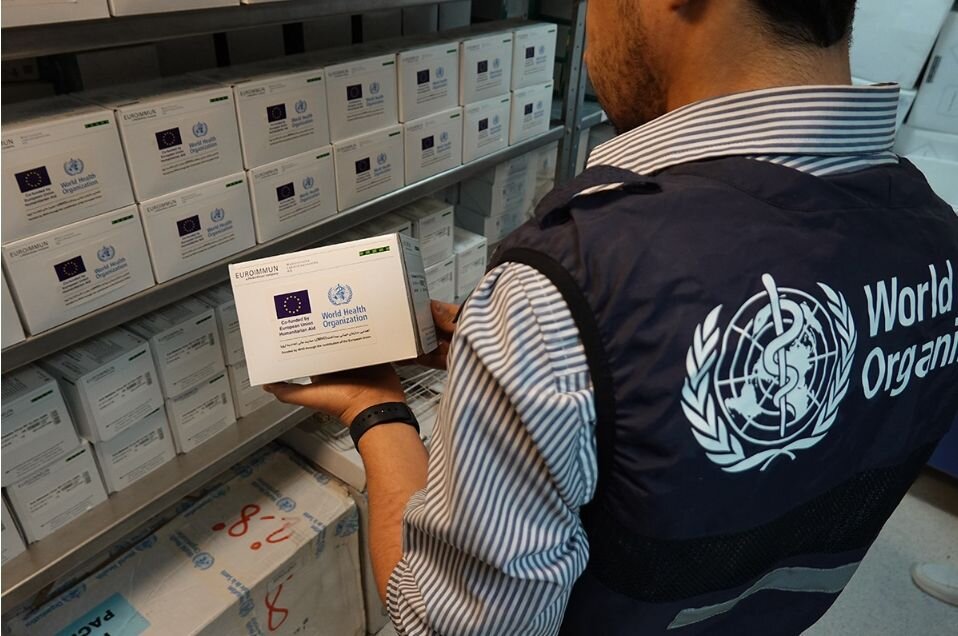Iran receives measles anti-body kits with WHO, ECHO support

TEHRAN –Iran has received a total of 160 measles antibody kits with the help of the World Health Organization (WHO) and the European Civil Protection and Humanitarian Aid Operations (ECHO).
Measles is potentially a deadly disease. Severe complications include pneumonia, diarrhea, blindness, and encephalitis (brain swelling).
The measles vaccination program in Iran started in 1984 when 34 percent of the population was vaccinated in the first year and 90 to 95 percent of the population after 6 years. Also in 2003, 33 million people were vaccinated with a national program to eradicate measles in the country.
The current procurement aims to enhance measles diagnostic capacities in Iran.
The kits are donated to the Iranian National Measles Reference Laboratory to bolster its capacities to diagnose measles, enhancing the country’s ability to respond more effectively to outbreaks, the WHO website reported on May 12.
According to the report, WHO, in collaboration with ECHO, procured and provided the kits to the National Influenza Center, which serves as the National Measles reference laboratory for measles, rubella, and some other respiratory infectious diseases.
Syed Jaffar Hussain, WHO Representative and Head of Mission in the Islamic Republic of Iran, said: “The provision of measles antibody kits to the reference laboratory is a crucial step in strengthening the Islamic Republic of Iran’s ability to detect and respond to measles outbreaks effectively and maintain measles elimination status.
This collaboration between WHO and ECHO demonstrates our commitment to support countries in their efforts to combat vaccine-preventable diseases.”
Measles remains a significant public health concern globally, and timely and accurate diagnosis is crucial for effective outbreak response.
While local health facilities play a vital role in screening and detecting suspected cases, confirmation by the reference laboratory ensures accuracy and prevents false results
The donated kits will enable the laboratory to perform confirmatory tests for more than 12,000 suspected measles cases.
This significantly enhances the country’s ability to identify and contain outbreaks.
Recent surveillance data show that over half of the measles cases in the country are among Afghan refugees.
The National Immunization Program in the Islamic Republic of Iran intends to build further capacities and a quality control mechanism for laboratory surveillance in some Iranian provinces.
This will help reduce the time to diagnosis if measles cases continue to rise.
Since April 2022, the Islamic Republic of Iran has experienced several measles outbreaks following the influx of Afghan refugees and migrants.
Thanks to its timely and comprehensive response, however, the Islamic Republic of Iran has been able to keep free of measles as a public health concern.
Measles and rubella eliminated in Iran
In April 2023, the World Health Organization confirmed that measles and rubella have been eradicated in Iran, Health Minister Bahram Einollahi said.
This success was achieved for the country in a situation where many European countries have not yet received approval from the World Health Organization regarding the eradication of measles and rubella, but the Islamic Republic of Iran has succeeded in eradicating these two diseases, he added, ISNA reported.
The measles vaccination program in Iran started in 1984 when 34 percent of the population was vaccinated in the first year and 90 to 95 percent of the population after 6 years. Also in 2003, 33 million people were vaccinated with a national program to eradicate measles in the country.
Concerns about the spread of measles in the country are growing as the Afghan population grows.
On December 31, 2022, the vaccination program for refugees and foreign nationals started with the aim of providing protection against polio and measles.
The program was implemented by 27 medical science universities focused on non-Iranian nationals under the age of 15, he added.
Iran’s Primary Health Care (PHC) system is known as a role model in the Health Sector which could be adopted by other countries, both in terms of expanded networking and outreach as well as the successful linkage between the Health Sector and Medical Education institutes, such as Medical Universities, according to UNICEF.
MT/ MG
Leave a Comment